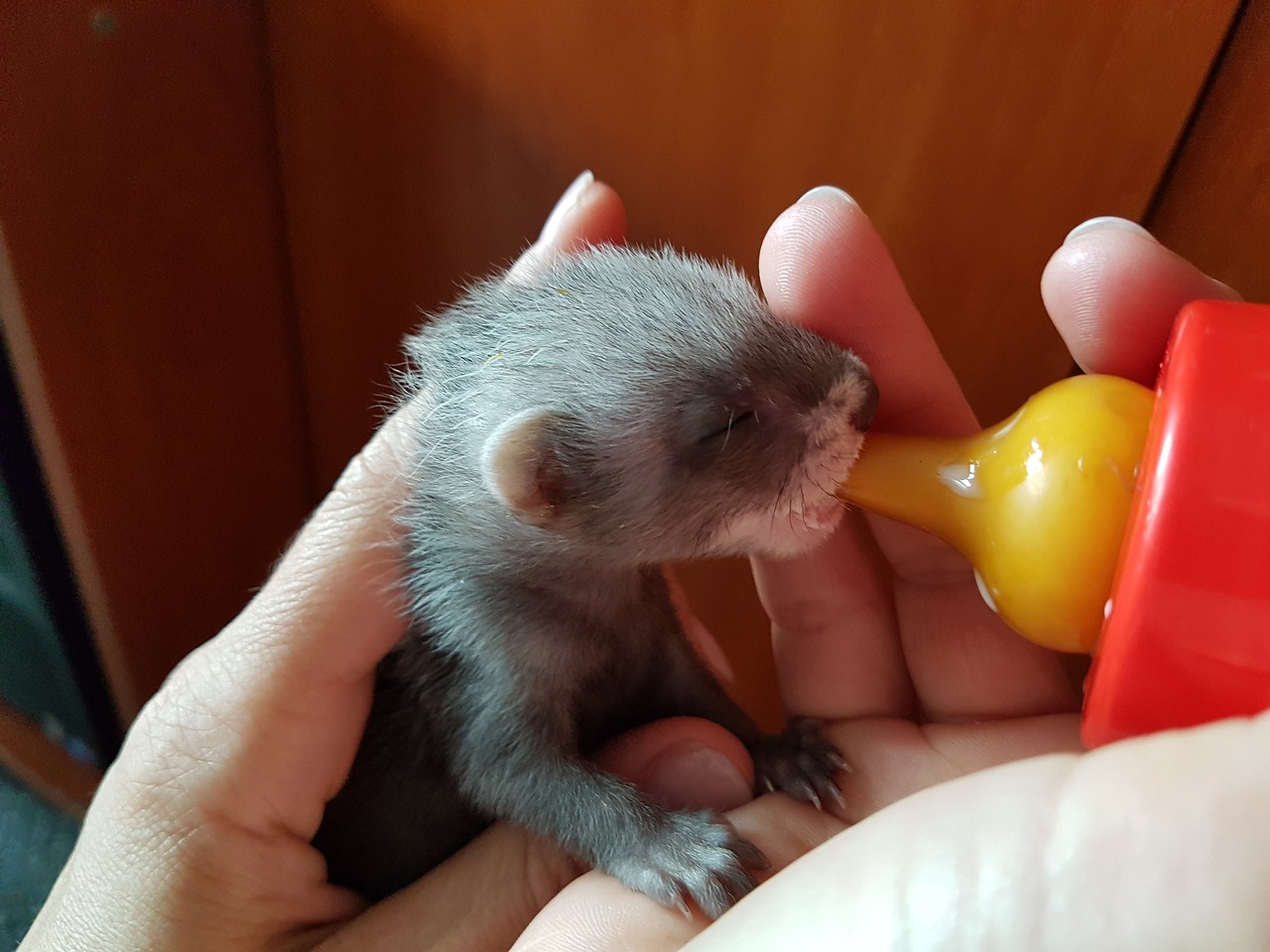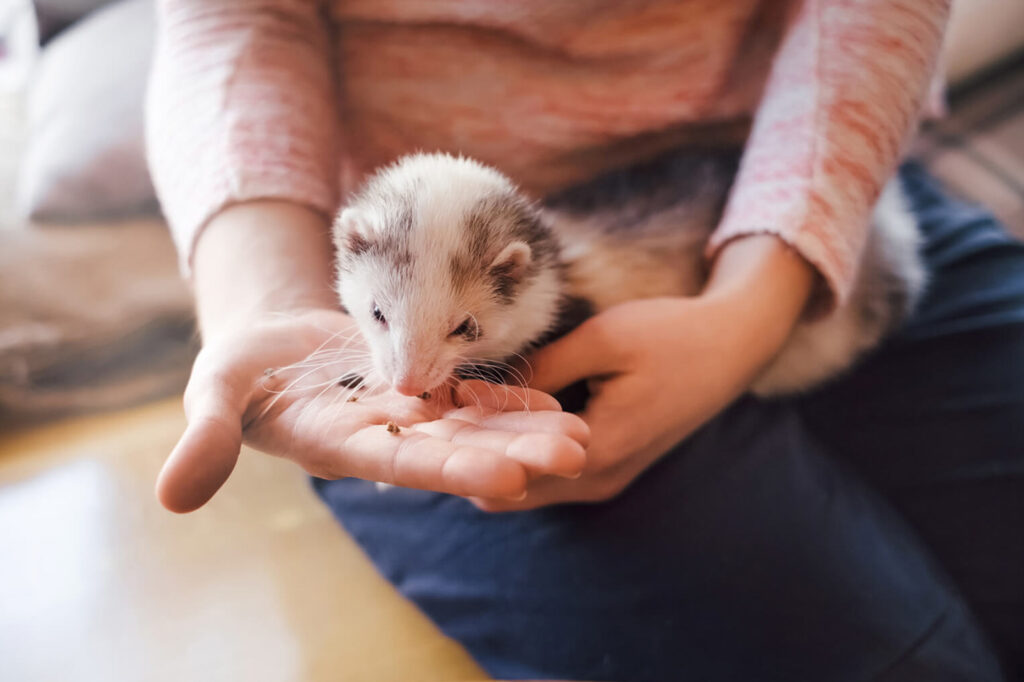What Do Ferrets Eat? (Good, Bad Foods And Feeding Guidelines)

Key Takeaways
- Provide a diet resembling their natural habitat: Offer a diet that mimics what ferrets eat in the wild, including high-protein and high-fat foods.
- Balanced nutrition is key: Ensure your ferret’s diet meets their nutritional requirements, with a focus on proteins and fats.
- Choose appropriate foods: Feed your ferret a diet consisting mainly of high-quality commercial ferret food or a mix of raw meat, organs, and bones.
- Avoid harmful foods: Keep your ferret away from foods like fruits, vegetables, dairy, and sugary treats that can be harmful to their health.
- Use treats sparingly: Opt for commercial treats made specifically for ferrets and limit them to occasional rewards rather than a significant part of their diet.
- Consult a veterinarian: Seek advice from a vet on providing any necessary supplements, vitamins, or minerals to ensure your ferret’s optimal health.
Topics Covered In This Article
- What Do Ferrets Eat In The Wild?
- What Are the Nutrient Requirements Of A Ferret?
- What Should My Ferret Eat?
- What Should My Ferret Not Eat?
- What Are the Consequences Of Malnutrition In Ferrets?
- Commercial Treats For Ferrets
- Metabolism Of Ferrets
- Supplemental Nutrition For Your Ferrets
- Ferret’s Diet In Their Different Life Stages
- How To Transition Your Ferret’s Diet?
- Summary
- Frequently Asked Questions
What Do Ferrets Eat In The Wild?

In the wild, ferrets have an omnivorous diet, consuming a variety of foods to meet their nutritional needs. According to the Biology and Diseases of the Ferret, 3rd Edition ferrets in the wild typically feed on small mammals, birds, reptiles, insects.
Their diet is diverse and includes only animal-based protein sources. Ferrets are skilled hunters and scavengers, capturing prey such as small mammals and birds to fulfill their high protein and fat requirements.
Ferrets also exhibit opportunistic feeding behavior, meaning they may scavenge for carrion or other animal remains to supplement their diet. This adaptability allows them to survive in various environments by consuming a range of available food sources.
In the wild, ferrets showcase their carnivorous nature by preying on small animals like rodents and birds while also incorporating fruits and insects into their diet for added nutrients.
Overall, the wild diet of ferrets is characterized by a mix of animal protein from hunting small prey and plant-based foods like fruits and insects. This varied diet reflects their omnivorous nature and ability to adapt to different food sources in their natural habitat.
What Are the Nutrient Requirements Of A Ferret?
Ferrets are obligate carnivores with specific nutritional requirements. Their diet should consist of high-quality animal-based food that meets AAFCO standards. The diet should provide the following nutrients:
- Protein: 30-40% on a dry matter basis
- Fat: 15-20% on a dry matter basis
- Fiber: Less than 3% on a dry matter basis
- Vitamins and Minerals: Essential vitamins and minerals such as Vitamin A, Vitamin D, Vitamin E, Vitamin B12, iron, zinc, calcium, phosphorus, potassium, and magnesium
- Taurine: 0.1-0.15% on a dry matter basis
- Caloric Density: 200 to 300 kcal /kg of body weight
Ferrets have specific nutrient requirements in their diet to maintain optimal health. High-quality animal protein should make up 30-40% of their total food intake. fat is essential, with levels ranging from 15-25%, increasing to 30% for pregnant ferrets. Their diet must be low in fiber and carbohydrates (also includes complex carbohydrates), typically less than 3% of the total intake.
Ferrets are strict carnivores, needing a diet rich in meat protein protein and fat. In captivity, replicating their wild diets is crucial for their well-being. The trend towards natural pet foods underscores the importance of whole, unprocessed ingredients for pets’ health. When selecting commercial ferret food labeled as “natural,” it refers to adherence to specific regulations governing pet food production.
What Should My Ferret Eat?
Ferrets have specific dietary needs and are not adapted to plant-based foods. Their bodies require nutrients found only in animal tissue as they are obligate carnivores which makes meat-based diet essential for their health.
The British Ferret Club recommends feeding ferrets a variety of animal proteins such as chicken, eggs, fish, rabbits, turkey necks, game birds, pigeons, minced beef, lamb, offal, lambs’ heart, raw animal bones for calcium intake and dental hygiene like chicken and lamb.
You can also provide them some cooked meat that’s low in sugar as an occasional treat for your ferrets. Cut the cooked meat in small pieces to ensure it doesn’t get stuck the the ferret’s throat and make sure it’s fresh meat.
In the wild or captivity setting mimicking their natural diet is beneficial for ferrets. Offering whole prey items like rabbits ,rats ,rodents ,mice ,cavies ,ducklings ,turkeys can provide them with the necessary nutrition they would consume naturally.
What Should My Ferret Not Eat?
When it comes to what a ferret should not eat, it is important to avoid certain foods that can be harmful to their health. Here is an in-depth explanation of what ferrets should not eat:
Foods to Avoid for Ferrets
- Dairy Products: Ferrets are lactose intolerant, so dairy products like milk and cheese should be avoided as they can cause digestive issues.
- Fruits and Vegetables: While some fruits and vegetables can be given as treats in small amounts, they should not be a significant part of their diet due to the high sugar content that can lead to digestive problems.
- High Carbohydrate Foods: Ferrets have a short gastrointestinal tract, so foods high in carbohydrates like grains and sugary treats should be avoided as they are not well-suited for their digestive system.
- Sugary Treats: Foods high in sugar like candies or sweet treats should be avoided as they can lead to obesity and dental issues in ferrets.
- Processed Foods: Processed foods designed for other animals or humans may not provide the necessary nutrients for ferrets and can be harmful to their health.
Toxic Substances
- Medications: Certain medications like ibuprofen and acetaminophen can be toxic to ferrets and should never be given to them as they can cause severe health issues including neurological signs, gastrointestinal problems, and even death.
- Zinc: Exposure to high levels of zinc, often found in galvanized materials, can lead to zinc toxicity in ferrets causing symptoms like anemia, weakness, and organ damage.
Clinical Signs and Diagnosis
- Ferrets exposed to toxic substances may exhibit symptoms such as depression, weakness, vomiting, diarrhea, neurological signs, anorexia, and metabolic disturbances.
- Immediate clinical intervention is crucial if a ferret ingests a toxic substance to prevent severe complications.
In summary, it is important to avoid feeding ferrets dairy products, high-carbohydrate foods, sugary treats, processed foods, toxic medications like ibuprofen and acetaminophen, as well as exposure to high levels of zinc.
Providing a diet that aligns with their carnivorous nature and avoiding harmful substances is essential for maintaining the health and well-being of ferrets.
What Are the Consequences Of Malnutrition In Ferrets?
Malnutrition in ferrets can have severe consequences on their health and well-being. According to the Biology and Diseases of the Ferret, 3rd Edition malnutrition can lead to various health issues, including cardiovascular problems.
Malnourished ferrets may exhibit echocardiographic changes that mimic cardiomyopathy, potentially leading to misdiagnosis. Additionally, malnutrition can impact the heart’s contractility and wall thickness, affecting the overall cardiovascular function of the ferret.
Furthermore, malnutrition can result in dehydration, which may lead to abnormal echocardiographic findings such as increased left ventricular interventricular septum thickness and altered left ventricular internal dimensions. Dehydrated ferrets may also show changes in systolic blood pressure measurements, with potential implications for their cardiovascular health.
In cases of malnutrition-induced bradycardia (abnormally slow heart rate), ferrets may be at risk of developing life-threatening conduction disturbances like second- and third-degree heart blocks. Severe bradycardia in ferrets with cardiac disease can have a poor prognosis, often leading to congestive heart failure (CHF) within a short period.
To address malnutrition-related cardiovascular issues in ferrets, treatment options include medications like isoproterenol, pseudoephedrine, or metaproterenol to manage severe bradycardia.
Additionally, vasodilators such as nitroglycerin cream and ACE inhibitors like enalapril can be used to support cardiac function and manage heart conditions in malnourished ferrets.
In conclusion, malnutrition in ferrets can significantly impact their cardiovascular health, leading to a range of complications such as echocardiographic abnormalities, dehydration-related changes in blood pressure, and potentially life-threatening heart rhythm disturbances.
Proper nutrition and timely veterinary intervention are essential to prevent and address the consequences of malnutrition on a ferret’s cardiovascular system.
Related Read : How Long Can Ferrets Survive Without Food And Water?
Commercial Treats For Ferrets
Ensuring that the ingredients are mainly animal-based is crucial. Avoid products with high-starch, vegetable proteins, plant-based proteins like peas, potatoes, corn, beans, or chickpeas as they can upset your ferret’s digestive system. It’s essential to check if the food matches their natural diet requirements: 30-40% protein, 15-25% fat, and less than 3% fiber.
For commercial ferret treats, opt for those with animal-based ingredients while steering clear of plant-based items such as fruits and vegetables. When selecting these treats, avoid harmful components like peanut butter, corn, soybean meal which may not sit well with your pet’s health needs. Remember that domestic ferrets need a diet rich in protein and fat due to being strict carnivores.
The trend towards natural pet food emphasizes whole ingredients aligning with ancestral nutritional philosophies; however, always prioritize meeting your ferret’s specific dietary requirements over trends or buzzwords in pet nutrition.
Anecdotal diets tailored for captive marsupials have shown success over time due to their dental and digestive adaptations suited for particular niches within the ecosystem.
The term “natural” concerning pet food has been defined by regulatory bodies like the Association of American Feed Control Officials (AAFCO).
Metabolism Of Ferrets
Ferrets possess a unique and interesting metabolism, characterized by high energy demands and efficient digestion. Here’s a breakdown of some key aspects:
High Basal Metabolic Rate: Compared to other mammals of similar size, ferrets have a surprisingly high basal metabolic rate (BMR). This means they burn through calories at a faster rate even when resting, requiring a constant intake of food to maintain their energy levels. Studies suggest this elevated BMR might be an adaptation to their active lifestyles and playful nature.
Specialized Digestive System: To fuel their high metabolism, ferrets have evolved a digestive system well-suited to processing a diet rich in protein and fat. Their short digestive tracts, compared to herbivores, allow for efficient nutrient absorption from their food. Additionally, ferrets are obligate carnivores, meaning they require animal-based protein for survival and cannot obtain essential nutrients from plant-based sources.
Short Transit Time: Due to their high metabolism and specialized digestive system, food moves quickly through a ferret’s digestive tract. This rapid transit time, around 3-4 hours, allows for efficient nutrient absorption but also means ferrets need to eat frequently throughout the day, typically every 2-4 hours, to maintain their energy and prevent hypoglycemia (low blood sugar).
Unique Insulin Production: Unlike most mammals, ferrets produce a unique form of insulin that allows them to efficiently regulate blood sugar levels despite their frequent feedings. This adaptation helps them maintain energy stability throughout the day and avoid blood sugar crashes.
Overall, a ferret’s metabolism is a fascinating system that allows them to be energetic, playful creatures. Their high BMR, efficient digestion, and unique insulin production are all adaptations that ensure they have the energy they need to thrive.
Supplemental Nutrition For Your Ferrets

When considering supplemental nutrition for your ferrets, aim for 80% real food in their diet, reserving the remaining 20% for supplements. These additions offer essential nutrients that may be lacking from regular meals. Supplements are convenient as they are small and appealing to ferrets.
Supplemental nutrition for ferrets can include things such as
- Baby Food
- Kitten Food
- Dried Ferret Food
Do not make supplemental nutrition the main part of the ferret diet as it can harm their health.
Vitamins And Minerals Requirement For Ferrets
The vitamin and mineral requirements for ferrets are essential to ensure their optimal health. According to the Biology And Diseases Of Ferrets 3rd Edition, Here are some key vitamins and minerals along with their recommended values for ferrets
- Vitamin A: Essential for vision, growth, and immune function. The recommended value is around 5000 IU/kg of diet.
- Vitamin D: Important for calcium absorption and bone health. The recommended value is approximately 500 IU/kg of diet.
- Vitamin E: Acts as an antioxidant and supports immune function. The recommended value is about 50 IU/kg of diet.
- Vitamin B12 (Cobalamin): Necessary for nerve function and red blood cell production. The recommended value is around 250 μg SC weekly.
- Iron: Important for preventing anemia, especially in ferrets with systemic coronavirus. Supplemental iron may be beneficial based on individual needs.
- Zinc: Required for various metabolic processes. The exact dose for ferrets is not specified in the provided information but should be included in their diet.
- Calcium: Essential for bone health and muscle function. The recommended value is approximately 0.5-1% of the diet.
- Phosphorus: Works with calcium in bone formation and energy metabolism. The recommended value is around 0.4-0.8% of the diet.
- Potassium: Important for nerve function and muscle contractions. The recommended value is approximately 0.6-1% of the diet.
- Magnesium: Necessary for enzyme function and muscle relaxation. The recommended value is about 0.06-0.1% of the diet.
These values may vary slightly depending on the specific dietary requirements of individual ferrets, so consulting with a veterinarian to tailor the diet to your ferret’s needs is advisable to ensure they receive adequate nutrition for their overall well-being and health
Ferret’s Diet In Their Different Life Stages
The diet of ferrets varies across different life stages to meet their changing nutritional needs. Here is an overview of a ferret’s diet in various life stages based on the provided information:
Ferret Diet by Life Stage:
- Kits (Baby Ferrets):
- Kits should primarily nurse from their mother for the first few weeks of life to receive essential nutrients and antibodies.
- As they transition to solid food, a high-quality kitten food with at least 32% protein and 18% fat is recommended.
- Wet kitten food can be softened with warm water to make it easier for kits to eat.
- Adult Ferrets:
- Adult ferrets require a diet rich in animal protein and fat to mimic their natural carnivorous diet.
- Commercial ferret foods or high-quality cat foods with at least 32% protein and 18% fat are suitable for adult ferrets.
- Avoid foods high in carbohydrates, as ferrets have a limited ability to digest plant-based ingredients.
- Senior Ferrets:
- Senior ferrets may have changing dietary needs, including lower calorie requirements due to decreased activity levels.
- Monitor their weight and adjust their food intake accordingly to prevent obesity or malnutrition.
- Consider senior-specific ferret foods that cater to the nutritional needs of aging ferrets.
Additional Dietary Considerations:
- Fresh Water: Ensure ferrets have access to clean, fresh water at all times to prevent dehydration.
- Treats: Treats should be given sparingly and should not exceed a few times a week to avoid overfeeding.
- Supplements: Consult with a veterinarian before adding any supplements to a ferret’s diet to ensure they are necessary and safe.
In conclusion, the diet of ferrets should be tailored to their specific life stage, providing them with the appropriate balance of nutrients essential for their growth, development, and overall health.
Regular veterinary check-ups can help ensure that a ferret’s diet is meeting their nutritional requirements at each stage of life.
How To Transition Your Ferret’s Diet?
To transition your ferret’s diet, follow these steps:
- Gradually Introduce New Food: Start by mixing a small amount of the new food with the current food. Gradually increase the proportion of the new food over a period of 7-10 days while decreasing the current food.
- Monitor for Digestive Issues: Watch for signs of digestive upset, such as diarrhea, vomiting, or decreased appetite. If these issues occur, reduce the amount of new food and increase the current food until the ferret’s digestive system adjusts.
- Consider Factors: Consider factors such as the ferret’s age, health, and current diet when transitioning to a new food. Consult with a veterinarian if unsure about the appropriate transition process.
- Monitor Weight: Monitor the ferret’s weight during the transition period to ensure they are maintaining a healthy weight.
- Consider Ferret’s Life Stage: Ensure the new food is appropriate for the ferret’s life stage, as their nutritional needs change as they grow.
- Transition to a High-Quality Diet: If transitioning to a high-quality ferret food, ensure it meets the ferret’s nutritional needs and is free from artificial colors, flavors, and preservatives.
- Consider Treats: If treats are part of the ferret’s diet, gradually transition them to a new treat that is appropriate for the ferret’s life stage and health.
- Monitor Health: Continue to monitor the ferret’s health during and after the transition period to ensure they are thriving on the new diet.
In summary, transitioning a ferret’s diet should be done gradually, considering factors such as the ferret’s age, health, and current diet. Monitor for digestive issues and weight changes during the transition period. Ensure the new food is appropriate for the ferret’s life stage and meets their nutritional needs.
Summary
The dietary needs of ferrets are crucial for their health and well-being. Understanding what ferrets eat in the wild, their nutritional requirements, suitable and unsuitable foods, as well as appropriate treats and supplements is essential for responsible ferret ownership.
Providing a balanced diet rich in protein, fat, and low in carbohydrates is key to ensuring a healthy life for these unique pets. Transitioning their diet correctly during different life stages and meeting their specific vitamin and mineral needs are also vital considerations.
For optimal ferret care, it is recommended to consult with a veterinarian specializing in exotic animals to create a customized diet plan. By following the guidelines outlined in this article and seeking professional advice when needed, ferret owners can ensure that their furry companions lead happy and healthy lives.
Frequently Asked Questions
Ferrets require a diet high in animal protein and fat. They are obligate carnivores, needing meat-based diets to thrive. Essential nutrients include taurine, amino acids, and fatty acids for their overall health.
Ferrets need to be fed frequently throughout the day as they have a total digestive tract time of 3 hours (180 minutes) when fed an animal based diet according to Bleavins MR, Aulerich RJ (1981). This means that a ferret can completely digest a food in three hours.
No, ferrets should not be fed fruits or vegetables as they cannot digest plant matter efficiently. Stick to a diet rich in animal proteins like raw meat or high-quality commercial ferret food.
Supplements may be necessary if your ferret’s diet lacks essential nutrients. However, always consult with a veterinarian before adding any supplements to ensure they meet your pet’s specific needs.
Start transitioning your kit (baby) from its mother’s milk to solid food at around 4-6 weeks old. Gradually introduce new foods over several days by mixing them with their current diet until fully transitioned.
Commercial treats made specifically for ferrets can be given occasionally but should not replace their main diet. Treats like freeze-dried meats or small amounts of cooked egg can serve as rewards sparingly.
Yes, Ferrets can eat tuna but it should be given as a treat and not be part of their regular diet. This is because tuna is high in histamine, mercury and unsaturated fats which are known to cause inflammation of fats, urinary stones. Etc
No, Ferrets cannot eat carrots as it is a plant based food that a ferret’s digestive system cannot process and it also contains high levels of sugar which can be lethal towards your ferret. There can be signs of weakness, weight loss, and excessive thirst if your ferret has consumed large quantities of carrots. In this situation contact a vet nearby immediately.
No, Ferrets cannot eat peanut butter because the ferret’s digestive system cannot process plant based foods like peanut butter and peanut butter is also high in sugar which can be lethal towards your ferret. Signs such as obesity, hypoglycemia, tooth decay, and sodium overdose can be found if your ferret has ingested high amounts of peanut butter.
No, Ferrets cannot eat chocolate as it contains a harmful substance called theobromine and the ferret’s digestive system cannot process non-animal based foods. Consumption of chocolate in ferrets can cause issues in the central nervous system, the cardiovascular system ,and the gastrointestinal tract.
Yes, Ferrets can eat eggs that are both cooked or raw. Just make sure that you are giving your ferret both egg yolk and egg white as egg yolks contain healthy fats and egg whites contain a good amount of protein. Giving too much eggs or making eggs part of the main ferret diet can cause problems such as constipation.
While cats also require a diet that is high in protein and fat it also includes plant based ingredients like corn which should be avoided in the ferret diet. Furthermore, cat foods do not contain enough protein and fats for a proper ferret diet. So it is best to give ferret specific foods to your ferret instead of giving them cat foods.
No, Ferrets cannot eat dog food as it is not suitable for the ferret’s digestive system, contains low protein and high amounts of carbohydrates which is not the right way of feeding your ferret. It also contains vegetable protein which is not good for ferrets.
Last Updated on 14 March 2024
Waman Nuka is a seasoned wordsmith and a passionate animal enthusiast with decades of experience in the world of animal care. With a deep love for all creatures great and small, Waman’s journey in the realm of animals started as a young boy exploring the lush forests surrounding his childhood home.


